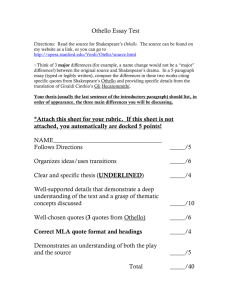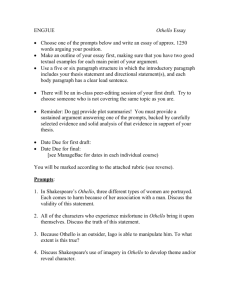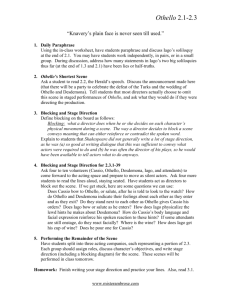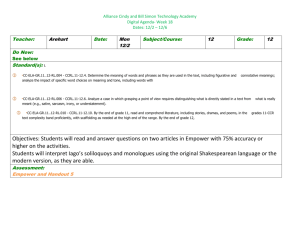Socratic Seminar Line of Questioning
advertisement
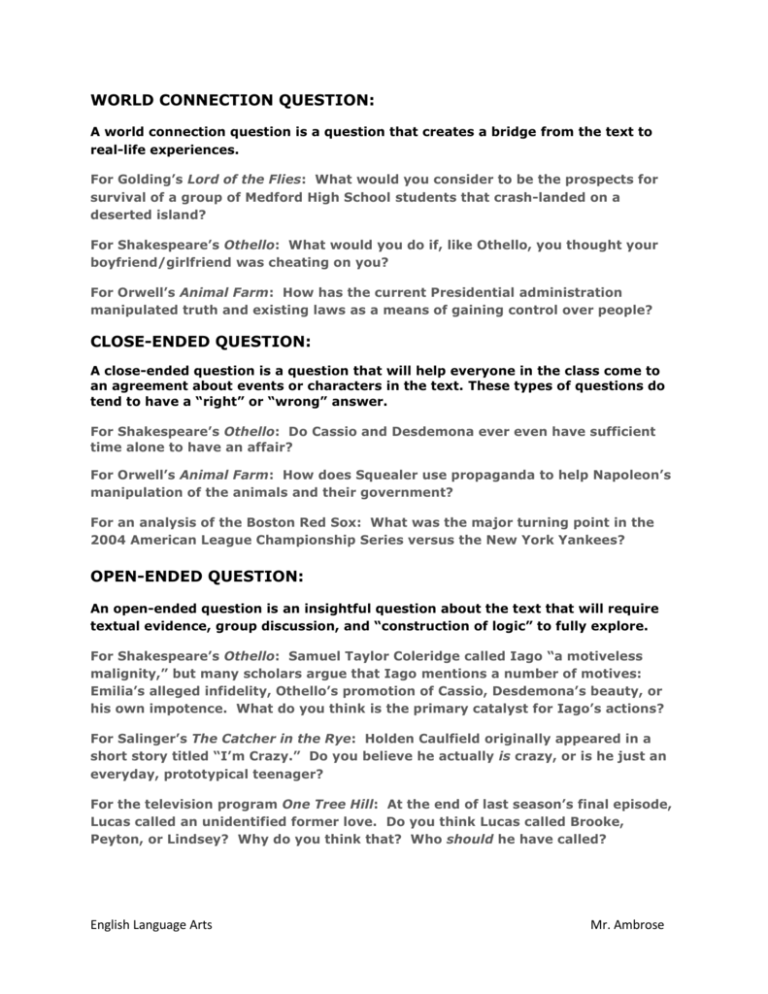
WORLD CONNECTION QUESTION: A world connection question is a question that creates a bridge from the text to real-life experiences. For Golding’s Lord of the Flies: What would you consider to be the prospects for survival of a group of Medford High School students that crash-landed on a deserted island? For Shakespeare’s Othello: What would you do if, like Othello, you thought your boyfriend/girlfriend was cheating on you? For Orwell’s Animal Farm: How has the current Presidential administration manipulated truth and existing laws as a means of gaining control over people? CLOSE-ENDED QUESTION: A close-ended question is a question that will help everyone in the class come to an agreement about events or characters in the text. These types of questions do tend to have a “right” or “wrong” answer. For Shakespeare’s Othello: Do Cassio and Desdemona ever even have sufficient time alone to have an affair? For Orwell’s Animal Farm: How does Squealer use propaganda to help Napoleon’s manipulation of the animals and their government? For an analysis of the Boston Red Sox: What was the major turning point in the 2004 American League Championship Series versus the New York Yankees? OPEN-ENDED QUESTION: An open-ended question is an insightful question about the text that will require textual evidence, group discussion, and “construction of logic” to fully explore. For Shakespeare’s Othello: Samuel Taylor Coleridge called Iago “a motiveless malignity,” but many scholars argue that Iago mentions a number of motives: Emilia’s alleged infidelity, Othello’s promotion of Cassio, Desdemona’s beauty, or his own impotence. What do you think is the primary catalyst for Iago’s actions? For Salinger’s The Catcher in the Rye: Holden Caulfield originally appeared in a short story titled “I’m Crazy.” Do you believe he actually is crazy, or is he just an everyday, prototypical teenager? For the television program One Tree Hill: At the end of last season’s final episode, Lucas called an unidentified former love. Do you think Lucas called Brooke, Peyton, or Lindsey? Why do you think that? Who should he have called? English Language Arts Mr. Ambrose UNIVERSAL THEME/ CORE QUESTION: Universal theme/core questions deal with the overarching message and relevance of the text. These questions should encourage the most heated group discussion. For Krakauer’s Into The Wild: Alaskan Park Ranger Peter Christian has written the following about Christopher McCandless, the book’s protagonist: “I am exposed continually to what I will call the ‘McCandless Phenomenon.’ People, nearly always young men, come to Alaska to challenge themselves against an unforgiving wilderness landscape where convenience of access and possibility of rescue are practically nonexistent…When you consider McCandless from my perspective, you quickly see that what he did wasn’t even particularly daring, just stupid, tragic, and inconsiderate. First off, he spent very little time learning how to actually live in the wild. He arrived at the Stampede Trail without even a map of the area. If he had a good map he could have walked out of his predicament.” Do you agree with this particular park ranger’s view, or do you see McCandless as more of a noble, tragic hero? For Rowling’s Harry Potter series: Are conservative Christian group’s justified in their criticism of the Harry Potter series, for its alleged glorification of “black magic”? For Chaucer’s The Canterbury Tales (or really any older work): Is this book still relevant to a modern audience, or should it be removed from our reading list in favor of more contemporary works? For Picoult’s My Sister’s Keeper: Is Anna justified in bringing a lawsuit against her parents to become emancipated? Is her decision selfish, or are her parents asking too much of her? What would you do? For Salinger’s The Catcher in the Rye: What can Holden’s situation teach us about how we should change the system of American public education? Above: An artist’s rendering of Socrates. So ”Was Socrates really ugly?” would clearly be an example of a close-ended question. There is a right answer, and no debate is necessary. English Language Arts Mr. Ambrose







